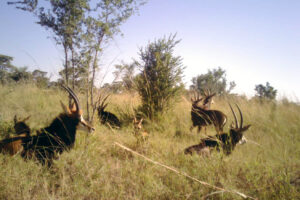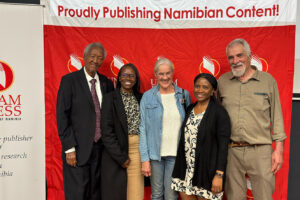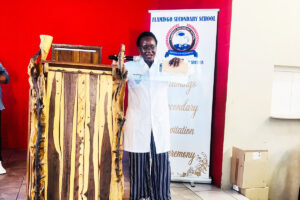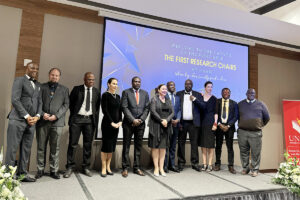A day in the life of a small-scale fisherman in Henties Bay
A joint research project between the University of Namibia (UNAM) and Helmholtz-Zentrum Hereon, titled Namibia Marine Ecosystem Services for Marine Spatial Planning (NAMares), recently undertook a trip to investigate small-scale fishery in Henties Bay.
This activity forms part of the project’s ecosystem services’ case studies and complements the Ministry of Fisheries and Marine Resources’ strategic focus on small-scale fisheries and its importance towards food security and poverty eradication.
The research, conducted by a team of UNAM researchers from the Sam Nujoma Campus and Helmholtz Zentrum Hereon, commenced along the C34 and Mile 27 – two of the many fishery sites designated by the Ministry of Fisheries and Marine Resources.
These sites are a source of income for many local fishermen including, 66-year-old Samuel Shatipamba, a retrenched mine worker, who resorted to fishing after several attempts to get another job.
Shatipamba narrated his account of fishing along the shores of Henties Bay, by stating that he wakes up at 5 am every day to prepare his gear and be ready for the truck to pick him up by 6 am. Transport is provided by the Hanganeni Fishing Association (HAFA) which supports local artisanal fishermen to gain an income from fishing.
Shatipamba remarked that: “HAFA allows us to catch unlimited fish. They take us to different fishing spots and buy our fish by weighing them per kg. The permit is also very affordable”. He further added that since he joined HAFA, he is guaranteed money every end of the week, although this is largely based on what he catches that week: “When I catch my fish I am guaranteed money every weekend based on my catch,” said a pleased Shatipamba.
Selling the catch of the day can be challenging, especially for non-HAFA members who have to look for customers after a long day at the beach. Many-a-time they have to drop their price to make sure they take money home.
Adjusting purchase prices has become the order of the day due to the flood of fish from ski – boats. Shatipamba recalls that HAFA had to adjust its prices according to the market, otherwise, high prices would mean no customers.
Other fishermen interviewed, shared the same sentiments. They complained that the discounted prices result in lower profit margins, making it hard to adequately provide for their family needs and with food prices so high, things are even harder now than before.
Although the income is not stable, as it depends on the catch one makes, Shatipamba remains grateful for the little he makes from it.
“I appreciate nature for what it gives us, and, urge all fisherman to follow the regulations as set out by the Ministry of Fisheries and Marine Resources. By doing so, future generations will be able to benefit from the same resources. The sea has plenty to sustain us all if we adhere to the guidelines and rules”, explained Shatipamba.
He further cautioned against illegal fishing and advised upcoming fishermen to be patient in this business. “In life, one has to be patient and fishing is not for the faint-hearted”, he elaborated.
Shatipamba was one of the few that were behind the idea of establishing HAFA, and he hopes that HAFA will become one of the largest fishing companies at the coast. As an experienced fisherman, he enjoys fishing as this activity allows him an opportunity to form friendships with foreigners during busy holidays. He also accompanies foreign fishermen to teach them fishing skills and to show them suitable fishing spots, while earning an extra income for himself and his family.
Fishing is a crucial activity providing a source of livelihood, income, and employment, particularly to the urban poor dwellers and their families. The Namibian Fishing sector has long been focused on large-scale commercial fisheries. However, now the focus is being drawn to small-scale fisheries and its importance towards food security and poverty eradication.
The NAMares project is funded by GIZ through the MeerWissen Initiative https://meerwissen.org/partnership-projects/namares





